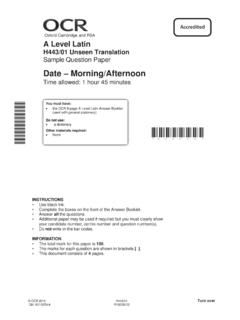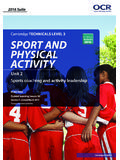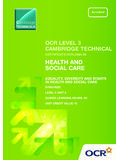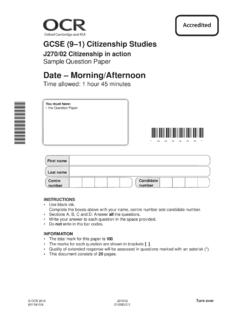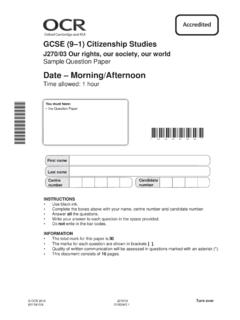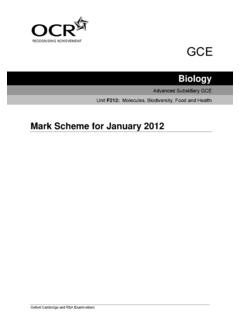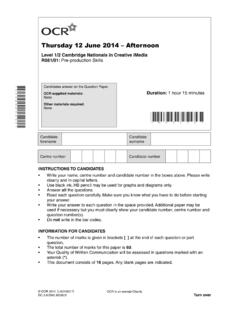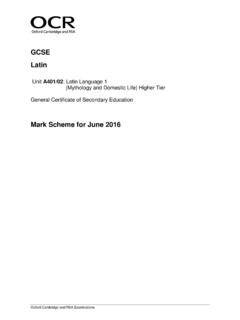Transcription of GCSE (9–1) ENGLISH LANGUAGE
1 QualificationAccreditedGCSE (9 1)Teacher GuideENGLISH LANGUAGE J351 For first teaching in 2015 unseen 20th and 21st century literary textsVersion (9 1) ENGLISH LanguageCopyright OCR 2016 Introduction unseen 20th and 21st century literary texts This collection of texts has been designed to support the teaching and delivery of the OCR GCSE (9-1) in ENGLISH LANGUAGE J351. These texts have been selected to fit the context of Component 2, Exploring effects and impact. There are 12 pairings of thematically linked texts from the 20th and 21st centuries, including prose fiction and literary non-fiction. They range from 300 to 600 words in length, comparable to the length of the unseen texts that students could encounter in the anthology can be used to develop students reading and LANGUAGE analysis skills and can be adapted to suit particular groups of students, learning styles or teaching approaches.
2 References have been given at the end of each text should you wish to look at a longer or an alternative extract as part of differentiated classroom texts cover a variety of themes and could be used as alternative learner resources for the suggested activities outlined in the approaching unseen 20th and 21st century literary texts delivery guide, available on the OCR website. This anthology could also be used for exam preparation. Theme: HomeThe Paying Guests Sarah Waters (prose fiction, 2014) Page 3 The Songlines Bruce Chatwin ( literary non-fiction, 1987) Page 4 Theme: DifferenceAbout a Boy Nick Hornby (prose fiction, 1998) Page 5 The Quarry Iain Banks (prose fiction, 2013) Page 6 Theme: MemoryHome Julie Myerson ( literary non-fiction, 2004) Page 7 The Ocean at the End of the Lane Neil Gaiman (prose fiction, 2013) Page 8 Theme: ParenthoodThe Children of Men James (prose fiction, 1992) Page 9 Man and Boy Tony Parsons (prose fiction, 1999) Page 10 Theme: RitualsMe Cheeta James Lever (prose fiction, 2009) Page 11A Rose for Winter Laurie Lee ( literary non-fiction, 1955) Page 12 Theme.
3 Leaving homeThe Bone Clocks David Mitchell (prose fiction, 2014) Page 13 Starter for Ten David Nicholls (prose fiction, 2003) Page 14 Theme: GuiltNo Night is Too Long Barbara Vine (fictional memoir, 1994) Page 15A Judgement in Stone Ruth Rendell (prose fiction, 1977) Page 16 Theme: Class and statusBad Blood Lorna Sage ( literary non-fiction, 2000) Page 17 Goodbye to All That Robert Graves ( literary non-fiction, 1929) Page 18 Theme: Youth and ageSomewhere Towards the End Diana Athill ( literary non-fiction, 2008) Page 19 Ammonites and Leaping Fish Penelope Lively ( literary non-fiction, 2013) Page 20 Theme: AftermathA Lovely Way to Burn Louise Welsh (prose fiction, 2014) Page 21 Empire of the Sun Ballard (prose fiction, 1984) Page 22 Theme: Parent-child relationshipsWe Had it So Good Linda Grant (prose fiction, 2012) Page 23 Why Be Happy When You Could Be Normal?
4 Page 24 Jeanette Winterson ( literary non-fiction, 2012)Theme: NostalgiaThe Ministry of Fear Graham Greene (prose fiction, 1943) Page 25 Bad Blood Lorna Sage ( literary non-fiction, 2000) Page 26G C S E (9 1) ENGLISH LANGUAGE3 GCSE (9 1) ENGLISH LanguageCopyright OCR 2016 Theme: HomeThe Paying Guests Sarah Waters (prose fiction, 2014) London, 1922. Frances s father and her two brothers, Noel and John Arthur, have been killed during the First World War. Frances and her mother have decided to take in lodgers as they are short of money. The lodgers, Mr and Mrs Barber, have just arrived at their house and are currently unpacking Frances reached to the lamp there were more footsteps in the room above; and then her hazel eyes returned to the ceiling. It might be Noel or John Arthur up there, she murmured, as the light went , yes, thought Frances a moment later, lingering in the shadowy hall, it might be; for she could smell tobacco smoke now, and hear some sort of masculine muttering up on the landing, along with the tap of a slippered male And just like that, like a knee or an elbow receiving a blow on the wrong spot, her heart was jangling.
5 How grief could catch one out, still! She had to stand at the foot of the stairs while the fit of sorrow ran through her. But if only, she thought, as she began to climb she hadn t thought it in ages if only, if only she might turn the stair and find one of her brothers at the top John Arthur, say, looking lean, looking bookish, looking like a whimsical monk in his brown Jaeger dressing-gown and Garden City was no one save Mr Barber, a cigarette in the corner of his mouth, his jacket off, his cuffs rolled back; he was fiddling with a nasty thing he had evidently just hung on the landing wall, a combination barometer-and-clothes-brush set with a lurid orangey varnish. But lurid touches were everywhere, she saw with dismay. It was as if a giant mouth had sucked a bag of boiled sweets and then given the house a lick.
6 The faded carpet in her mother s old bedroom was lost beneath pseudo-Persian rugs. The lovely pier-glass had been draped slant-wise with a fringed Indian shawl. A print on one of the walls appeared to be a Classical nude in the Lord Leighton manner. The wicker birdcage twirled slowly on a ribbon from a hook that had been screwed into the ceiling; inside it was a silk-and-feather parrot on a papier-m ch landing light was turned up high, hissing away as if furious. Frances wondered if the couple had remembered that she and her mother were paying for that. Catching Mr Barber s eye, she said, in a voice to match the dreadful brightness all around them, Got everything straight, have you? whimsical: unusual, playful and unpredictablebarometer: an instrument used to forecast the weatherWaters. S, The Paying Guests, (2014), Virago Press, London, : Home4 GCSE (9 1) ENGLISH LanguageCopyright OCR 2016 Theme: HomeThe Songlines Bruce Chatwin ( literary non-fiction, 1987) Here, Chatwin remembers how he first became fascinated with Australia (a place he would later travel to) and his early life during World War also knew, from my great-aunt Ruth, that Australia was the country of the Upside-downers.
7 A hole, bored straight through the earth from England, would burst out under their feet. Why don t they fall off? I asked. Gravity, she had in her library a book about the continent, and l would gaze in wonder at pictures of the koala and kookaburra, the platypus and Tasmanian bush-devil, Old Man Kangaroo and Yellow Dog Dingo, and Sydney Harbour the picture l liked best showed an Aboriginal family on the move. They were lean, angular people and they went about naked. Their skin was very black, not the glitterblack of negroes but matt black, as if the sun had sucked away all possibility of reflection. The man had a long forked beard and carried a spear or two, and a spear-thrower. The woman carried a dilly-bag and a baby at her breast. A small boy strolled beside her l identified myself with remember the fantastic homelessness of my first five years.
8 My father was in the Navy, at sea. My mother and l would shuttle back and forth, on the railways of wartime England, on visits to family and the frenzied agitation of the times communicated itself to me: the hiss of steam on a fogbound station; the double clu-unk of carriage doors closing; the drone of aircraft, the searchlights, the sirens; the sound of a mouth-organ along a platform of sleeping , if we had one, was a solid black suitcase called the Rev-Robe, in which there was a corner for my clothes and my Mickey Mouse gas-mask. I knew that, once the bombs began to fall, I could curl up inside the Rev-Robe, and be safe. Tasmanian bush-devil: a wild carnivore that lives on the Australian island of TasmaniaOld Man Kangaroo: a fully grown male kangarooYellow Dog Dingo: a wild dog with a sandy coloured coatAboriginal: native of Australia dilly-bag: a traditional Aboriginal bag used to collect foodChatwin.
9 B, The Songlines, (1987), Vintage, Random House, London, (9 1) ENGLISH LanguageCopyright OCR 2016 Theme: DifferenceAbout a Boy Nick Hornby (prose fiction, 1998) 12-year-old Marcus s mother and father separated four years ago. Marcus has recently moved from Cambridge to London with his mother. It is his second day at his new school and he has arrived early and gone to the form room to try and avoid some students that have been giving him a hard were a couple of girls in the room, but they ignored him, unless the snort of laughter he heard while he was getting his reading book out had anything to do with was there to laugh at? Not much, really, unless you were the kind of person who was on permanent lookout for something to laugh at. Unfortunately, that was exactly the kind of person most kids were, in his experience.
10 They patrolled up and down school corridors like sharks, except that what they were on the lookout for wasn t flesh but the wrong trousers, or the wrong haircut, or the wrong shoes, any or all of which sent them wild with excitement. As he was usually wearing the wrong shoes or the wrong trousers, and his haircut was wrong all the time, every day of the week, he didn t have to do very much to send them all knew he was weird, and he knew that part of the reason he was weird was because his mum was weird. She just didn t get this, any of it. She was always telling him that only shallow people made judgements on the basis of clothes or hair; she didn t want him to watch rubbish television, or listen to rubbish music, or play rubbish computer games (she thought they were all rubbish), which meant that if he wanted to do anything that any of the other kids spent their time doing he had to argue with her for hours.
